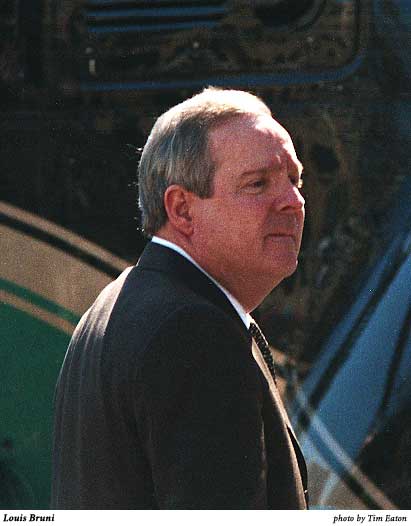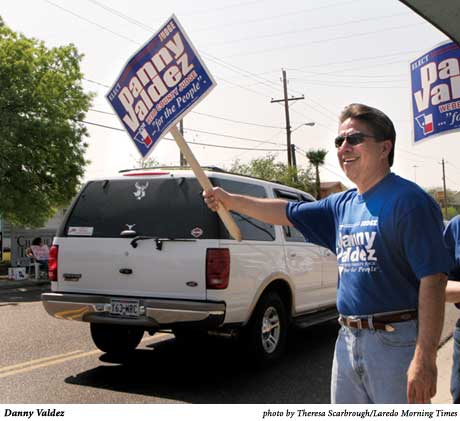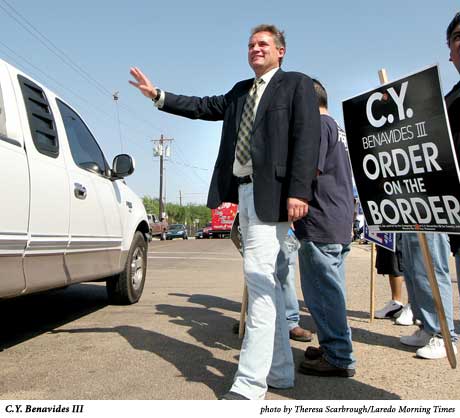The Fall of King Louie
Bruni?s gone, Valdez and Benavides duke it out to become the next Webb County judge
Webb County Judge Louis Bruni had big plans. So lofty were Bruni’s ambitions that he wanted to change the South Texas climate – not the political climate but the weather itself. The man some people called King Louie invested $1.2 million in private money in Russian technology that is supposed to ionize the atmosphere and make it rain.
But how quickly the winds can change. In one of the most startling results of the March 7 Democratic primaries, Judge Bruni, who reigned supreme over the county since 2003, finished last in a field of four candidates. Now his rainmaking machine sits on the ranch of his chief of staff, its future as uncertain as Bruni’s and Webb County’s.
With no candidate clearing 50 percent in the primary, the top two finishers are headed for an April 11 runoff. Danny Valdez, an unassuming justice of the peace from Laredo, received 37 percent of the 31,657 votes cast. He’ll face Carlos “C.Y.” Benavides III, a rich oilman and rancher who placed second with 23 percent. Current county commissioner Judith Gutierrez finished third and is now looking at a full-time career as a Realtor.

The county judge controls a $58 million general budget, appoints people to cushy county jobs, and has a say about who gets the lucrative county contracts. As a regional powerbroker, the Webb County judge is second only to longtime state Sen. Judith Zaffirini, D-Laredo.
Now, in the runoff between Valdez and Benavides, voters have a choice between political opposites. And because Webb County is not partial to Republicans, the winner in April can start planning his office décor.
Benavides, who raises exotic species of deer on his family’s land, may not have been as well known as other candidates before the primary. That’s no longer the case. By spending about $600,000 of mostly family money, he has covered the county with his image and slogans. White stenciled stickers reading “C.Y. Sí ’06” are on tinted car windows all around Laredo. Billboards portraying a dated photo of Benavides with long sideburns—which he trimmed after someone told him they made him look unserious—have sprouted up along Interstate 35, north and south. His face is also on thousands of yard signs throughout the county.
Businesslike in his approach to politics, Benavides talks about his 20-month campaign to increase name recognition as a marketing endeavor. To raise his profile, he hosted an auto show, held an art exhibit with some of his original pieces, and organized several concerts, including one that featured a member of the 1970’s band Foreigner.
But Benavides also knows how old-school politics works, which he might have learned from his father and uncle, each of whom served as Webb County judges. His most recent campaign finance report shows thousands of dollars in payments for contract labor, much of which was paid to people who claim the ability to turn out votes. He doesn’t leave all the work to paid staffers and vote-gatherers, called cañoneros. Benavides has been a tireless campaigner. He says he has taken only one vacation since kicking off his campaign; it was to chase a longtime dream of hunting Marco Polo sheep in the subzero climes of Tajikistan.

Danny Valdez says he’s taken one vacation, too, since he began his run for county judge—a quick jaunt to Las Vegas. That might not be as impressive as whacking big-horned sheep in central Asia, but it shows a style that might be easier for the average Webb County voter to relate to.
Valdez says he will spend up to $160,000 by the end of the runoff, compared with the $700,000 Benavides will go through. Benavides acknowledges the financial advantage but claims he needs to counteract other factors. He says the political machine of Sen. Zaffirini pitched in to help Valdez—a charge Valdez denies and the Senator says she knew nothing about, but jokingly takes credit for in light of Valdez’s margin of victory on March 7.
Having grown up in the barrios of west Laredo, Valdez embraces the image of financial underdog. “I don’t need to match [Benavides], and I don’t need to spend what he’s going to spend,” Valdez says.
A lot of people see Valdez as the hard-working, earnest, everyman candidate. “I think he has a reputation of being decent and honest, and I think a lot of people appreciate that,” said Jerry Thompson, a political science professor at Texas A&M International University in Laredo. “Plus, [there’s] the fact that a lot of people in the poor neighborhoods know Danny.”
As he campaigns in the neighborhoods, Valdez finds plenty of people he knows. During a night of block-walking before the primary, one middle-aged man thanked Valdez for being the justice of the peace at his wedding; an elderly woman thanked him for staying with her the night her husband died; one young woman credited Valdez with helping her raise money for the Miss Texas pageant. (The woman recalled meeting Miss Corpus Christi, who turned out to be actress Eva Longoria of ABC’s Desperate Housewives.)
Valdez had some commercials on television, but his campaign appears to take place mostly on foot, as he walks door-to-door throughout Laredo. After working his day job as J.P., Valdez gets into his silver Ford F-150 pickup, goes to his campaign office, and then to the neighborhoods. Sometimes he’s solo. Other times, his wife walks with him or volunteers join him. But there are no paid staffers; he’s never paid anyone to work on his campaigns.

The Benavides campaign operates, by contrast, like a big humming machine. Staffers around the county are on the Benavides payroll. Some work the phones to identify undecided voters, and when they find one, the name gets added to a list for a personal phone call from the candidate himself. Benavides told me he walks blocks, but on the day I dropped in, he slapped backs at a bowling event for kids and checked on the staff at campaign headquarters. He also spent a considerable amount of time re-applying Neutrogena Healthy Defense makeup during the taping of a television commercial. In this one, he responded to one of Bruni’s attacks about tax dodging—an accusation that made Benavides so mad he filed a defamation suit against Bruni. (The case is pending but not likely to get too far in the courts.)
Those hard-edged tactics used by Bruni may have been partly what cost him the election. Thompson, the A&M International political science professor, said Bruni’s managers “gave him some bad advice” by urging a negative campaign. While the challengers attempted to run on positive themes, Bruni went after each opponent with harsh television ads. Thompson notes that negative ads can backfire. “I think he went too negative, and I think also that he may have gone overboard. People were just turned off by those negative ads,” Thompson said.

Gutierrez said one of the reasons she entered the race was because of Bruni’s proclivity to offend citizens in commissioners court. The Laredo Morning Times reported in September 2003 that Bruni told a woman speaking before the court, “You know, you remind me of my ex-wife.” On the campaign trail, Gutierrez told me, “I have a very big problem with people being treated like dirt. He’s totally—I mean totally—rude.”
Bruni, for his part, didn’t make excuses for his gruffness, especially when it comes to Gutierrez, who sits to his immediate right in commissioners court. “She’s not a leader. She’s a follower,” Bruni said of his colleague. He seemed sure of making it to a runoff, and his pollsters backed that up, he said. That self-assurance may have led him to campaign with less fervor than his opponents. He skipped two of eight debates and was not nearly as visible on the streets of Laredo as his opponents.
As in most hard-fought campaigns, a whirl of rumors circulated. There were whispers, for example, about Bruni’s involvement in cattle rustling. I asked Bruni about it and he confirmed an incident from his distant past. In fact, he’s able to laugh about it now. As he tells it, he was in his twenties when he was taken into custody for cattle theft. He said he and his friends were driving around, and someone had a sudden desire for a barbecue. In the excitement of the moment, a farmer’s calf was shot. Bruni said he was not charged and since then has not been involved in such cattle capers. That story led to another one. Back when he was deputy sheriff, he said, he recalled a 130-mile-per-hour car chase that ended with a foot chase of a young man. He recalled dragging the man off a fence, stepping on his neck, and pointing a service revolver in his face, only to realize that the captive was a teenager. His point seemed to be that these experiences are part of what made him into who he is today.
Clearly the man has made a few enemies. As a city councilman—the job he held before becoming county judge— Bruni was arrested for an alleged violation of the Texas Open Meetings Act. The charges were eventually dropped, and he took a two-hour refresher course on what open meetings are supposed to mean in Texas.
Rumors circulated about the other candidates, as well. Benavides, for example, was said to have a domestic violence record. When asked by LareDOS, a monthly publication in Laredo, if he had been arrested, his answer was a simple “Yes.” When I asked him to elaborate, he told me about three occasions when police took him into custody because of domestic violence allegations, which he said were later retracted. He denied abusing his ex-wife and said he was never charged. Benavides said the incidents, while regrettable, were the result of a rocky marriage. Because the charges were unfounded, he said, they are not relevant in the campaign.
In the brief stretch before the runoff, Benavides wants to concentrate on the basics of campaigning, which may be a little easier without Bruni’s attacks in television ads. His campaign manager, Aldo Ortegon, said in the remaining days, the campaign strategy will include targeted block-walking, more ads, and vying for the support of those who backed Gutierrez and Bruni. Valdez says the key will be to keep his supporters’ enthusiasm high and to make sure they get to the polls one more time. To that end, he’s still block-walking. “That’s been my M.O.,” he said. “That’s not going to change.”
THE MARQUEE RACE IN HIDALGO COUNTY!
Deep in the Rio Grande Valley, another incumbent county judge failed to win re-election in a high-dollar race for the county’s top spot.
Hidalgo County Judge Ramon Garcia was barely dislodged by Juan de Dios “J.D.” Salinas in the March 7 Democratic primary. According to an unofficial tally, Salinas gathered 9,596 votes, or 50.3 percent of the vote.
Salinas had to dish out about three-quarters of a million dollars to take the post. “If you are going to try to unseat incumbents, you better bring a good war chest with you,” says Jerry Polinard, a political science professor at the University of Texas–Pan American. “Good county judges’ races don’t come cheap anymore.”
Salinas says he had no choice but to spend heavily in the campaign against Garcia. “He was a multimillion-dollar trial lawyer and an incumbent and a political institution who’s been around for 30-plus years, and he’s got a great political machine that I had to outwork,” says Salinas, a former Hidalgo County Clerk.
Final campaign finance reports are not yet available and Judge Garcia didn’t return calls, but Salinas estimates that Garcia spent at least $800,000—about what he reportedly spent four years ago to beat then-incumbent Judge Eloy Pulido.
Polinard says the campaign, which was “by far the marquee race in the county,” largely focused on the conflict between Garcia and the county commissioners. The commissioners backed Garcia four years ago but this time supported his opponent.
Commissioner Hector “Tito” Palacios supported Salinas early. He says he appreciated Salinas’s pledge to be a full-time county judge. He faulted Garcia for spending too much time as a plaintiffs’ lawyer. “It’s not that we don’t want to work with him,” Palacios says of Garcia. “He really didn’t spend, in my opinion, a lot of time as county judge.”
Garcia reportedly didn’t take the squeaker of a loss well. A local television station, KRGV, said Garcia is planning to ask for a recount of the election that the county says he lost by 616 votes. Considering his line of work, a lawsuit wouldn’t surprise too many people either, especially in light of news from the electronic newspaper The Rio Grande Guardian that cited an unnamed source close to Garcia as saying that the recount is a precursor to a lawsuit, though it has been unclear on what grounds he might sue. —TE


